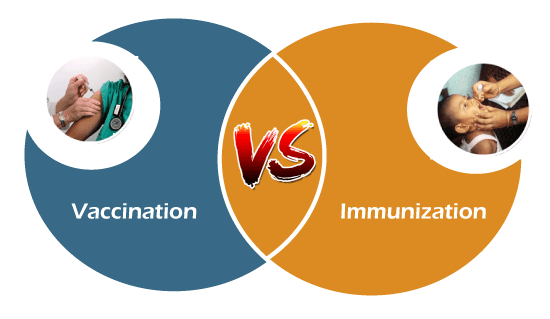Difference between Vaccination and ImmunizationAs we know that every nation is suffering from the COVID-19 pandemic. It has grown fatal in the following year. Many deaths and infections have been recorded in the past year. Apart from the COVID-19 pandemic, black fungus and swine flu have been on the rise again. The doctors are time and again advising people to take the vaccination in order to immune themselves from the diseases. In infancy, we have been given a lot of vaccinations for hepatitis, influenza, etc. The human body has always been subjected to diseases, be it cold, cough, flu, etc. In times of disease, it is important to take care of oneself. Taking regular medicines and following some home remedies are necessary to fight certain diseases. Fortunately, the vaccines have been made for the pandemic, and almost everyone has got their first shot of the vaccine. It is essential to vaccinate as vaccination creates a protective shield around the body through which the disease cannot enter. Similarly, vaccines are necessary to keep the body healthy and fit. Now, today we will discuss about the importance and purpose of vaccination and immunization, followed by their differences. So, let us begin. 
VaccinationVaccination is defined as the process of providing immunity to the body against infectious diseases. Vaccination helps in producing immunity into the body. Interestingly, vaccines are made to prevent diseases and not to fight them when they occur. The entire immune system is stimulated through a particular shot of vaccination. In the COVID-19 pandemic, there are four significant kinds of vaccines, i.e., protein subunit, whole virus, nucleic acid, and viral vector. Now, why are vaccines essential? Well, there are a lot of reasons for which vaccinations are necessary. They help in preventing fatal diseases and nearly protect children and elderly people. They help in controlling the epidemics and also limit drug resistance. Apart from the COVID-19 pandemic, the important vaccines are that of flu, polio, hepatitis B, mumps, chickenpox, tetanus, HiB (Haemophilus Influenza Type B), etc. These vaccines are basically given to us in infancy. Well, apart from the importance and the types of vaccinations, there are several home remedies that might reduce the effects of a disease. These herbs are sage, basil, rosemary, garlic, peppermint, fennel, etc. Apart from vaccinations, it is also essential to keep our bodies healthy and fit. Drinking in moderation, having a healthy diet, maintaining a healthy weight, quit smoking, getting enough sleep, etc., are some of the measures one can take after taking the desired vaccination. It is very important to take care of yourself during the pandemic, even after getting vaccinated. ImmunizationImmunization is defined as the process of introducing a vaccine into a person's body to protect him from a fatal disease. Immunization helps in triggering the immune response in the body against fatal diseases. If you have been exposed to a particular disease, the immune system in the body will be triggered, and the body will be protected from the disease. To prevent cough, hepatitis B, shingles, etc., several vaccinations like subunit, polysaccharide, conjugate vaccines, and recombinant are taken. According to WHO, immunization is a global success in health and development, thereby saving a million lives. The immune system actively responds after immunization. There are several immunization programs that have been set up to provide services in order to ensure the safety and immunity of people. These programs include documented evidence of immunization, spreading awareness of immunization and re-immunization, etc. It is interesting to note that immunization is essential during infancy and adulthood in order to promote healthy aging. Immunization does not provide lifelong immunity against diseases. That is why it is required in adulthood and later years as well. Now, there are certain differences between vaccination and immunization. So, let us have a look at them.
So, these are some of the contrasting points regarding vaccination and immunization. Now, let us look at the importance of vaccination and immunization. Importance of Vaccination & Immunization
So, these are some of the critical points regarding vaccination and immunization. Both vaccination and immunization are essential at every phase of life. They create a protective layer around the body so that fatal diseases are prevented. Thus, both vaccination and immunization are necessary for the human body.
Next TopicDifference between
|
 For Videos Join Our Youtube Channel: Join Now
For Videos Join Our Youtube Channel: Join Now
Feedback
- Send your Feedback to [email protected]
Help Others, Please Share










